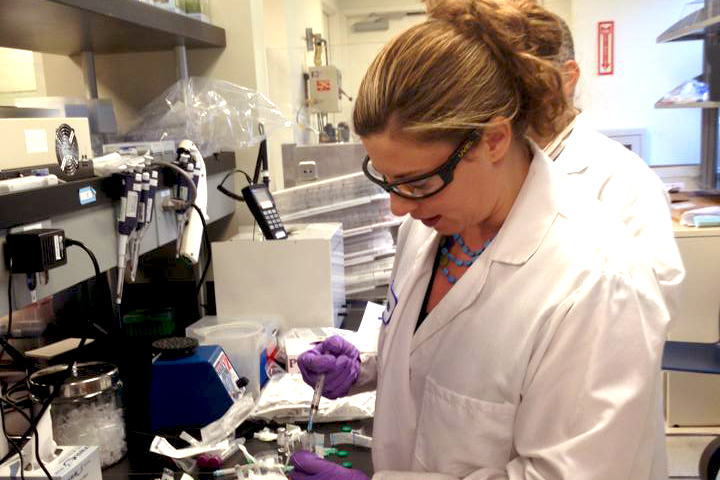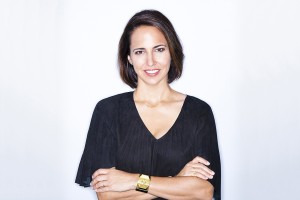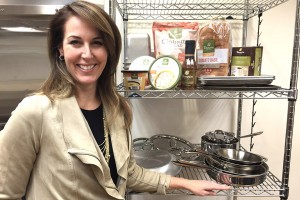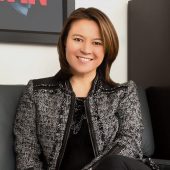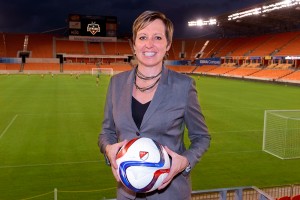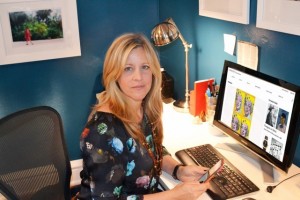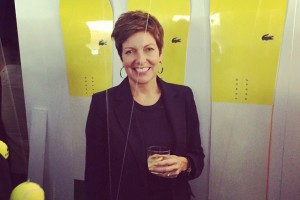Sandra Shpilberg, STEM Advocate and VP of Strategic Marketing at Nora Therapeutics in Palo Alto
Born in Uruguay, Sandra Shpilberg came to the U.S. at age sixteen, settling with her family in Brooklyn, NY. With an industrious work ethic inspired by her native land — which she describes admiringly as “gender-neutral” – she held several jobs while a teenager, even interning at JPMorgan by her freshman year at Pace University. She subsequently graduated from there with a degree in accounting, before deciding to transition over to her current field.
Ms Shpilberg, currently living in Palo Alto, CA and in her favorite job she has ever had as the Vice President of Strategic Marketing and Commercial Planning at Nora Therapeutics, works for a company devoted to finding cures for unexplained recurrent miscarriage, a job that she says inspires her with “a grand vision that someday we may be able to help women with recurrent miscarriage have a successful pregnancy.”
In addition to her role at Nora Therapeutics, Ms. Shpilberg currently writes on gender topics for The Huffington Post.
Can you tell the readers a little bit about yourself?
I am a biotechnology executive at Nora Therapeutics, where we are developing the first treatment for women with unexplained recurrent miscarriage. During my career, I have been involved in the development and launch of several medicines – many for rare diseases where there are absolutely no other treatment options. On the personal side, I am a wife, a mother of two, and I still call my parents in NY every single day. I am an advocate for women leading in whatever they choose to do. I also write for the Huffington Post on gender issues, among other topics.
What was your very first job?
My first unpaid job was helping my father in his hardware store: I arranged the merchandise, made sales and in the slow hours, played checkers with my dad. But my very first paid job was at a clothing store in Montevideo, Uruguay. I was 14 years old, and I was a salesperson helping customers choose between stripes or flowers. Once we moved to the U.S. — armed with such relevant previous experience! – I got a job as a floor person at Berta’s, a now-defunct Brooklyn institution for the procurement of cheap textiles made abroad. Soon, I was promoted to cashier. In the summer of my freshman year of college I started working as an Intern at JPMorgan, and that was my first corporate job.
What does a day in your shoes typically look like?
I will start the day in the office and look at my list of projects and advance those that need advancing. I’ll Facebook campaign to help patients find our trial, I’ll work on a market research interview guide, or I’ll revise the revenue forecast and NPV model. I’ll lead a Commercial Strategy Team meeting and work with the Nora team to revise our Target Product Profile or a disease awareness campaign. In the afternoon, I might go to Stanford University to meet with one of the doctors that evaluates women with recurrent miscarriage. Then, I will go home for dinner with my family and homework and fun time with my kids.
What is your favorite part about your job?
The favorite part of my job is interacting with the patients and doctors who use our medicines.
What are the first 3 things you do when you wake up in the morning and the last 3 things you do before you go to bed?
In the morning, the first three things I do when I wake up is greet my husband and dog (who sleeps in our bed, of course!), go for a 30 min walk/jog outside, and then I wake up the kids and dole out all sorts of orders to get them ready for their day.
At night, I review my schedule and to-dos for the next day, I take a bath and then I either read literature or attempt to write literature.
What is your breakfast of choice?
One scrambled egg on multi-grain, multi-seed toast and decaf Earl Gray tea.
What keeps you energized and motivated at work?
I am motivated by the grand vision that someday we may be able to help women with recurrent miscarriage to have a successful pregnancy. I am also motivated by the possibility of our company growing.
What or who inspires your work?
What inspires me is the creation of something that can better another person’s life. In biotech, we develop what I call “products of high utility” – our medicines reach people that really need them. To me, this is what delivers meaning to the entire drug development process: connecting to the potential of making someone’s life a little better. I have been so fortunate to meet many of the patients and their families, and there is nothing more meaningful than seeing their lives improved.
How does your culture/background influence your work?
My upbringing in Uruguay made me appreciate the importance of human connection and to veer towards work that provided those components. I also grew up without many of the gender biases that are common in the U.S.: In Uruguay women worked, they led, they had children, and many times they out-earned men. My mother and father were the best and most intimate role models of this gender neutral dynamic.
My immigration to the United States developed my work ethic and determination. Without a safety net of any kind, I had to figure it out on my own and work hard for each accomplishment, stitching my own safety net, one knot at a time.
What has been your biggest obstacle in your career, and how did you overcome it?
The biggest obstacle I have encountered in my career has been the genderization of executive teams at some of the larger companies; women still make up less than 15% of executive jobs, and I find that not only unfair, but unacceptable. Having managed both women and men, I can tell you the truth: there are no logical reasons why women have been excluded from executive jobs. Most importantly, this genderization of executive teams is detrimental to business growth.
How many times have you changed your career direction?
Though I started my career in financial control on Wall Street, I soon discovered it didn’t offer the human element that I was craving. To make that career switch, I retooled with an MBA from Wharton and a summer internship at Genentech – the mother of all biotech companies. Combined, these two experiences allowed me to pursue the business side of bringing medicines to the market.
Why did you decide to go back and get your MBA, and what would you recommend to young women going back to get theirs?
I decided to get my MBA because I wanted to switch from finance to entrepreneurial management in an industry with a human component. For me, my MBA at Wharton was formative and fundamental, as it gave me the opportunity to pause, retool, have an internship, meet incredibly qualified classmates and alumni, and set on a new career path. For young women looking to shift careers, an MBA may be a very helpful step.
Are there any STEM programs you are part of or support?
Broadly, I am an advocate for all of these programs. Specifically, I support She++ and Girls Who Code. Also, I started a group for Biotech Women Leaders in the San Francisco Bay Area so that we can support each other to grow in our careers.
Three questions you like to ask during an interview to know if the candidate (or job) is the right fit?
-
-
- “What has been your most meaningful accomplishment to date?” This allows me to see what this person values in his or her professional growth
- “If you took this job, what would be the first three things you would do upon joining?” Here I am looking for how he or she approaches a new task: do they seek information first? Do they seek relationships?
- “What do you do in your free time?” I believe in surrounding myself with people who live full and meaningful lives.
-
What are the most important qualities of a good leader?
Vision – A good leader provides an aspirational view of the future, of what we are trying to do together.
Execution – A good leader follows through and executes to realize the vision.
What is your favorite leisure activity after a stressful work week?
Going to Shoreline Lake and renting a pedal boat with my kids and husband. Inevitably, something funny always on those boats, and we all laugh and forget any stresses that may be lurking in the background. One time, we got stuck in the muck – all of us, except my daughter, who was the youngest person on the boat, were too unwilling to get out, get wet, and push. So she did it! She got out, she got wet, she pushed us out of the muck and jumped back in. She was our hero forever! Talk about a little girl with leadership and execution skills.
What advantages do you see as a woman in the workplace?
In my specific role at Nora Therapeutics where we are developing a medicine for women with recurrent miscarriage, I do see a great advantage in being a woman. Having had one miscarriage myself, I can truly connect to the state of mind, the logistical situations and the need of the women whom we seek to serve. Prior to this role, however, I would have responded that being a woman is not a variable – it is neither an advantage, nor a disadvantage – I bring a unique thought process to each situation and that has more to do with my background, training and experience than it has to do with my gender.
What advice would you give women starting their career?
When I started my career, I didn’t appreciate the value of accumulated experience through time. Back then, I thought that if I was smart and worked hard, I should be able to progress at a rapid pace. But now I see that there is incredible value in having a collection of experiences, and those are accumulated to some extent through the passage of time. I would advise young women to find out which are the experiences that are meaningful for your career path, and then seek them, even if they involve taking a risk. For me, I sought to lead a product launch and to lead a drug development team, and I switched jobs and took risks to gain these career-enabling opportunities.
What book would you recommend for women just starting their career?
I am a huge fan of literary memoirs – they are not business books, but they could be. What I like about memoirs is that authors generally describe a true personal struggle with great intimacy and candor. My favorite literary memoir is Wild: From Lost to Found on the Pacific Crest Trail by Cheryl Strayed [it was also recently turned into a film starring Reese Witherspoon]. Wild isn’t a business book, yet it contains so many lessons that could be applicable to a career. You may feel lost at times, but keep putting one step in front of another, and eventually you may become “found.”
TAGS: SharpSavvySignificant
 Interviewer Interview Prep
Interviewer Interview Prep Impactful Mentees
Impactful Mentees Benefits of a Mentor
Benefits of a Mentor Advice for First-Time Managers
Advice for First-Time Managers Overcoming the 18-month Itch
Overcoming the 18-month Itch Dressing for Your Style
Dressing for Your Style Interview Style Tips
Interview Style Tips Women's Stocking Stuffers
Women's Stocking Stuffers Gift the Busy Traveler
Gift the Busy Traveler Father’s Day Gift Guide
Father’s Day Gift Guide Airport Layover Activities
Airport Layover Activities Traveling & Eating Healthy
Traveling & Eating Healthy Travel Like a Boss Lady
Travel Like a Boss Lady The Dual California Life
The Dual California Life Gifts for Thanksgiving
Gifts for Thanksgiving Summer Reading List
Summer Reading List Top Leisurely Reads
Top Leisurely Reads New Year, New Books
New Year, New Books Life Lessons from a Sitcom
Life Lessons from a Sitcom Oprah, Amy or Amal?
Oprah, Amy or Amal?





